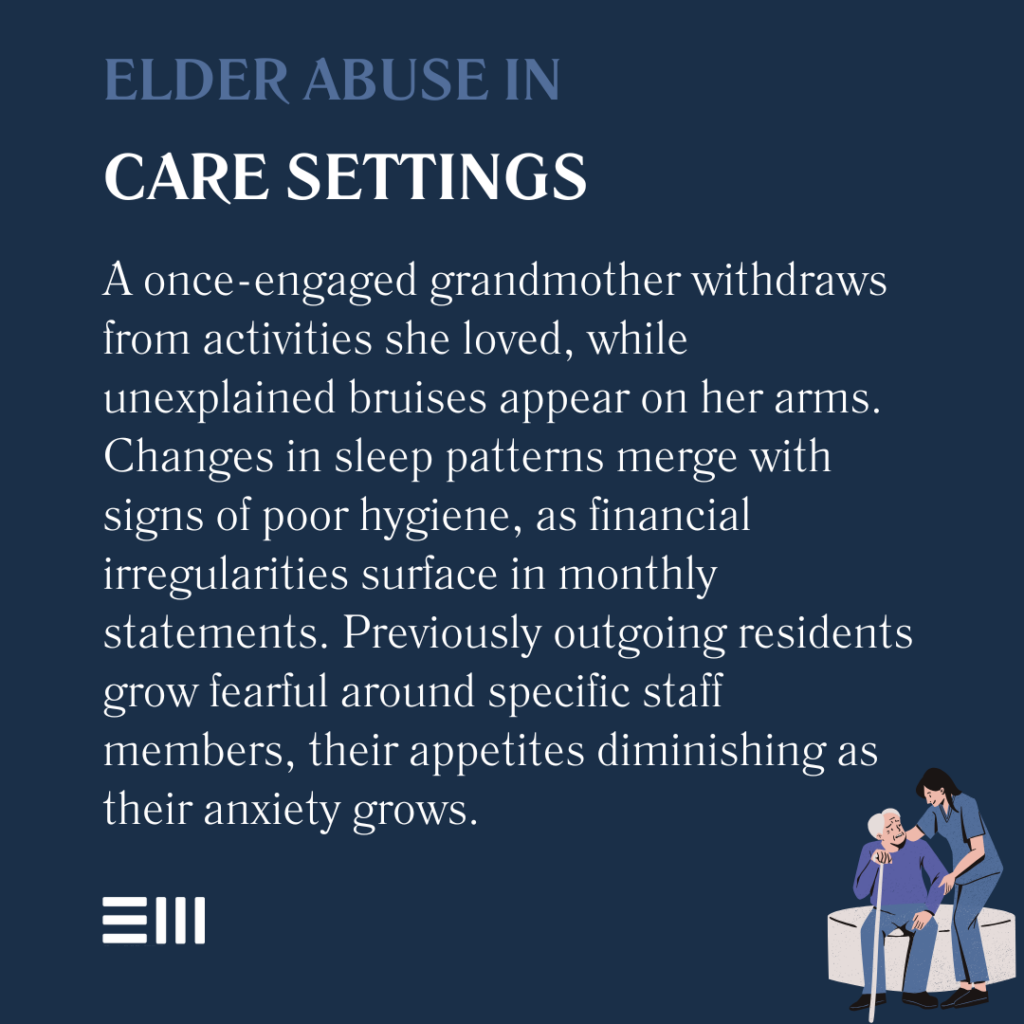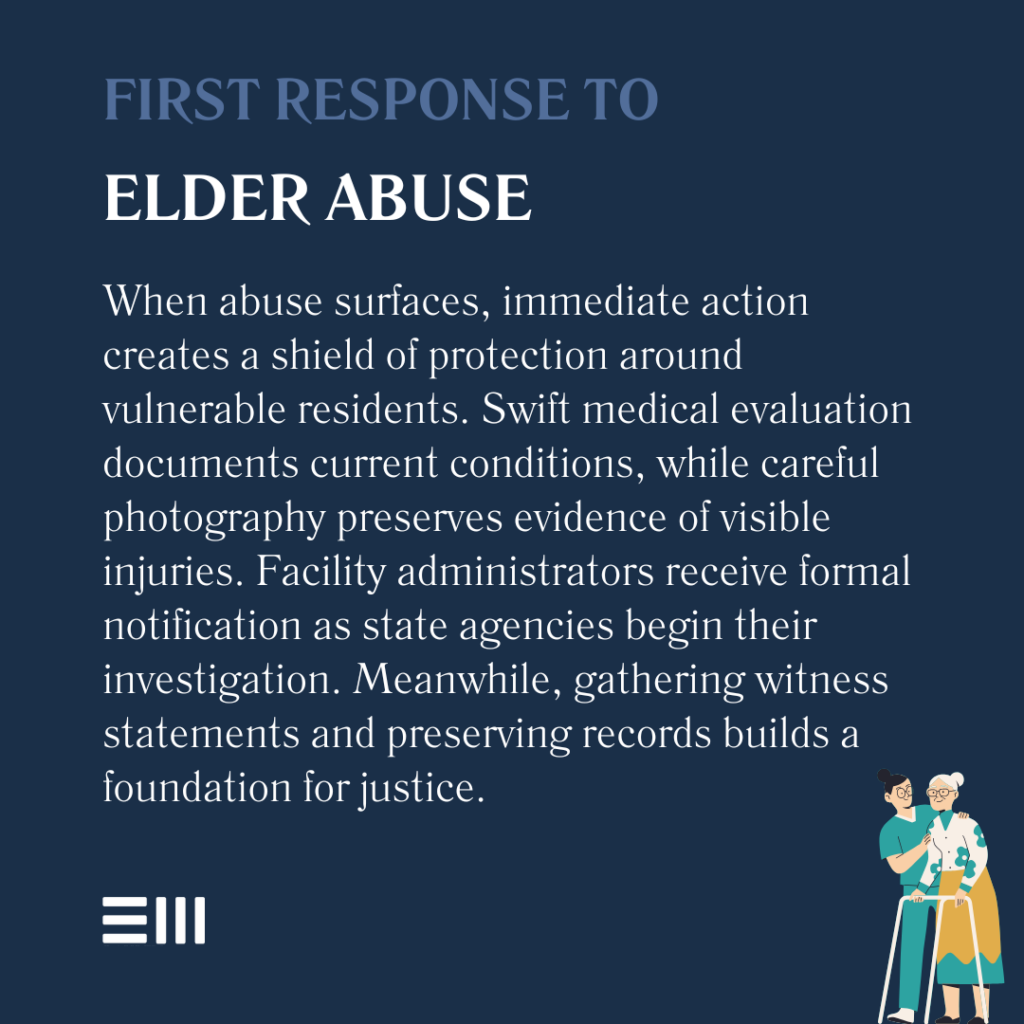
Behind closed doors, in places meant to provide comfort and care, some of our most vulnerable loved ones face betrayal in their final chapters.
A grandmother’s unexplained bruises, a father’s sudden withdrawal, a mother’s missing jewelry—these subtle signs often mark the beginning of stories that families never imagined writing.
Yet, in these moments of discovery, understanding the signs and knowing how to act can transform despair into justice.
Recognizing Signs of Elder Abuse
Elder abuse manifests in various forms, each with distinct warning signs that family members and visitors can learn to recognize. These indicators often appear gradually, making awareness and regular observation essential for protecting vulnerable residents.
Common signs of abuse include:
- Unexplained bruises, cuts, or physical marks;
- Sudden changes in behavior or emotional state;
- Withdrawal from previously enjoyed activities;
- Unexplained financial transactions;
- Poor hygiene or untreated medical conditions;
- Bedsores or pressure ulcers;
- Signs of malnutrition or dehydration;
- Missing personal items or valuables;
- Fearful behavior around specific staff members; and
- Changes in sleep patterns or appetite.
Understanding these warning signs helps families take prompt action when abuse occurs.

Types of Nursing Home Abuse
Abuse in nursing homes takes many forms, each requiring different approaches for identification and intervention.
Understanding these various types helps families and advocates better protect vulnerable residents. The complexity of nursing home environments, combined with residents’ varying levels of cognitive ability and communication skills, makes recognition of abuse patterns particularly challenging.
Staff turnover and shift changes can also mask systematic abuse, making thorough documentation and observation essential.
Categories of abuse include:
- Physical abuse and rough handling;
- Emotional or psychological manipulation;
- Financial exploitation and theft;
- Neglect of basic needs and care;
- Sexual abuse and inappropriate contact;
- Medical neglect or medication errors;
- Social isolation and restriction;
- Verbal abuse and humiliation;
- Unauthorized physical restraint; and
- Denial of essential services.
Recognition of these abuse types enables more effective reporting and intervention strategies.
Immediate Steps After Discovering Abuse
When signs of abuse emerge, taking prompt and appropriate action can prevent further harm and preserve evidence for future legal action.
A systematic approach helps ensure both immediate safety and long-term justice.
Critical immediate actions include:
- Ensuring resident safety and medical care;
- Documenting all signs and symptoms;
- Reporting to facility administration;
- Contacting state oversight agencies;
- Preserving evidence and records;
- Seeking medical evaluation;
- Filing police reports if necessary;
- Consulting with legal professionals;
- Gathering witness statements; and
- Securing resident transfer if needed.
These steps create a foundation for protecting residents and pursuing accountability.

Legal Rights and Protections
Nursing home residents enjoy specific legal protections under both federal and state law. Understanding these rights helps families advocate effectively for their loved ones and pursue appropriate remedies.
The Nursing Home Reform Act of 1987 established fundamental standards of care, while state regulations often provide additional protections tailored to local conditions.
Modern legislation increasingly addresses issues like electronic monitoring and social media privacy, adapting protections to contemporary challenges in long-term care settings.
Key legal protections include:
- Right to dignified and respectful care;
- Freedom from abuse and neglect;
- Access to medical records;
- Choice in medical treatment;
- Protection of personal property;
- Right to file grievances;
- Privacy in personal matters.
- Freedom from discrimination;
- Visitation rights; and
- Financial autonomy.
Knowledge of these rights empowers families to advocate effectively for their loved ones.
Reporting and Documentation
Proper reporting and documentation strengthen cases against abusive facilities and staff members. Creating a clear record helps protect current and future residents while building stronger legal cases.
Modern technology has expanded documentation options, with smartphone cameras and secure communication apps providing new tools for families to record concerns.
However, understanding facility privacy policies and state recording laws remains crucial for gathering admissible evidence.
Essential documentation includes:
- Detailed incident descriptions;
- Photographs of injuries or conditions;
- Medical examination records;
- Witness statements and contacts;
- Communication with facility staff;
- Reports to regulatory agencies;
- Financial records, if relevant;
- Timeline of events and changes;
- Staff schedules and assignments; and
- Facility response documentation.
Thorough documentation supports both immediate intervention and long-term legal action.
Frequently Asked Questions About Elder Abuse in Alabama
Families facing suspected nursing home abuse in Alabama often have urgent questions about their rights and options.
These answers provide guidance for common concerns in these challenging situations.
How Can I Prove Nursing Home Abuse?
Documentation, including photographs, medical records, witness statements, and detailed incident reports, helps establish patterns of abuse.
Professional evaluations from medical experts and elder care specialists can also provide crucial evidence. Video evidence, when legally obtained, can be particularly compelling.
Additionally, tracking staff schedules, medication logs, and care plans can reveal discrepancies that support abuse claims. Social workers and elder care advocates often provide valuable testimony about industry standards and facility compliance.
What Happens After I Report Abuse?
State agencies typically investigate reports within specific timeframes, often conducting unannounced facility visits.
Investigations may involve interviews with staff, residents, and families while examining facility records and practices. Regulatory bodies may impose sanctions, require corrective action plans, or even suspend facility licenses in severe cases.
Criminal investigations might run parallel to administrative proceedings, particularly in cases of physical or financial abuse. Facilities often face increased monitoring and mandatory reporting requirements following substantiated abuse claims.
Can I Move My Loved One Immediately?
Yes, residents have the right to transfer to another facility, even during investigations. However, proper medical discharge planning ensures safe transitions and preserves important evidence.
Who Pays for Medical Care After Abuse?
Facilities may bear responsibility for medical costs related to abuse or neglect. Medicare, Medicaid, and private insurance often cover immediate care while legal claims proceed.
Will the Facility Retaliate if I Report Abuse?
Retaliation against residents or families for reporting abuse is illegal. Federal and state laws provide specific protections against such behavior.
Fight Harder, Fight Smarter
Elder abuse shatters trust and dignity, but you don’t have to face this challenge alone. Our experienced legal team understands the complexities of nursing home abuse cases and stands ready to help you protect your loved one’s rights and dignity.
Contact us for a confidential consultation to discuss your concerns and explore your options. We’ll help you understand the path forward and support you in seeking justice for your loved one.
Take the first step toward protecting their future—reach out now.
Can't find what you're looking for? Search our site below.










